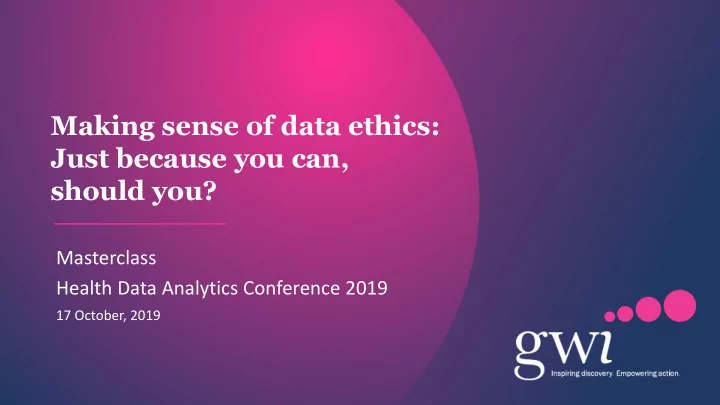

Making sense of data ethics: Just because you can, should you? Masterclass Health Data Analytics Conference 2019 17 October, 2019
Michelle Teis Liz Jones Partner Michelle Teis is a leading data and information Associate Director Liz Jones has more than 20 years’ strategist and expert data governance professional with experience working with organisations across the more than 25 years industry experience. health, government, not-for-profit and commercial sectors on their digital strategies. Michelle has worked extensively across all dimensions of strategic With a passion for improving health outcomes for Australians and data management including strategy and planning, ethics, quality specialist expertise in digital transformation and change, Liz has management, data exchange and data privacy and security. contributed to the delivery of major initiatives, including the national digital health record system on behalf of the Federal Government.
Aims of this masterclass • Understand what data ethics is, what it is not, and why it is important • Data ethics’ relationship to governance, privacy and security • How to identify ethical issues relating to data and information • What happens when it goes wrong?
An ethical tsunami “Big data is an ethical challenge for healthcare privacy — a tsunami, really” “There is no question that individual privacy will be compromised to some degree by computer analytics making use of vast amounts of personal information for medical care, research protocols, and health insurance.”
ethics ? What is data
What is data ethics? A new branch of ethics that tackles problems posed by the collection, analysis and use of data.
Why do we need to consider ethics? The opportunity to use data for good needs to be balanced against the risk of misuse and the social licence to operate.
The biggest risk "...the biggest risk to people with chronic disease or disability is not from un- authorized sharing or use of their personal health information… …it is from the failure to share, or inadequate use of that information and…valuing protecting privacy over protecting an individual's life." - Chairman of the Health Priorities Project of the Progressive Policy Institute
Question Would you be happy for your personal health information to be used for research purposes by Government? Would your view change if your information were to be used by a pharmaceutical company?
Building Public trust 2010 – Healthcare Identifiers Act passed 2012 – MHR launch, opt-in system 2018 – MHR legislation changes 2019 – MHR opt-out system
Question Have you ever faced an ethical decision relating to the way that data is collected, managed, used or shared? e.g. clinicians sharing patient images outside of secure messaging software OR OR appropriateness of aggregating personal data for use in analysis for publication or use
In the absence of strong ethical guidelines ACCC proceedings in the federal court against HealthEngine alleging misleading and deceptive conduct relating to the sharing of consumer information with insurance brokers and the publishing of patient reviews. “ HealthEngine recognises that our rapid growth over the years has sometimes outpaced our systems and processes and we sincerely apologise if that has meant we have not always met the high expectations of us.” HealthEngine CEO, Marcus Tan
Algorithmic bias Google Translate Showed sexist tendencies by assigning feminine gender pronouns to certain jobs and masculine pronouns to others – “she is a babysitter” and “she is a nurse” “he is a doctor” and “he is hard working” It picks up the gender bias that already exists in the world and plays it back to us. We need to ensure that algorithms don’t perpetuate and reinforce existing biases.
“In the absence of leadership people don’t do anything”
Foster a culture that values ethical collection, management, analysis and use of data 15
Data ethics in context DATA SECURITY is focussed on the protection of data from malicious attack. Data DATA PRIVACY is the right of individuals to control Ethics the way their personal information is handled DATA ETHICS tackles ethical issues posed by the collection, analysis and use of data and information. Data Data It is more than just complying with privacy legislation Privacy Security or applying data security. DATA GOVERNANCE is the discipline that coordinates privacy, security and ethics (amongst other data disciplines).
Building a data ethics framework Thresholds Assessment Principles Action Outcome Develop Assess the guiding Define the Determine Building trust ethical issues principles for ethical actions to be and and their the ethical thresholds taken Accountability impact data handling Fit for purpose approach Mobilisation
Common Principles Start with clear user need and public benefit Be aware of relevant legislation and codes of practice Use data that is proportionate to the user need Understand the limitation of the data Obtain consent when collecting or using personal data
Key takeaways • Data ethics is a branch of ethics that tackles issues posed by the collection, analysis and use of data and it relates to judgement, culture and leadership • Central tenet - Do no harm • A Data Ethics Framework will help provide your organisation with a consistent approach to ethical handling of data and information • Data ethics is no longer ‘emerging’ – today’s data driven environments demand that ethical approaches to building trust with patients/ clients/customers is critical NOW • Building and maintaining trust is key.
Get in touch Michelle Teis, Partner michelle.teis@gwi.com.au Liz Jones, Associate Director Liz.Jones@gwi.com.au LinkedIn @gwi.com.au www.gwi.com.au
Recommend
More recommend